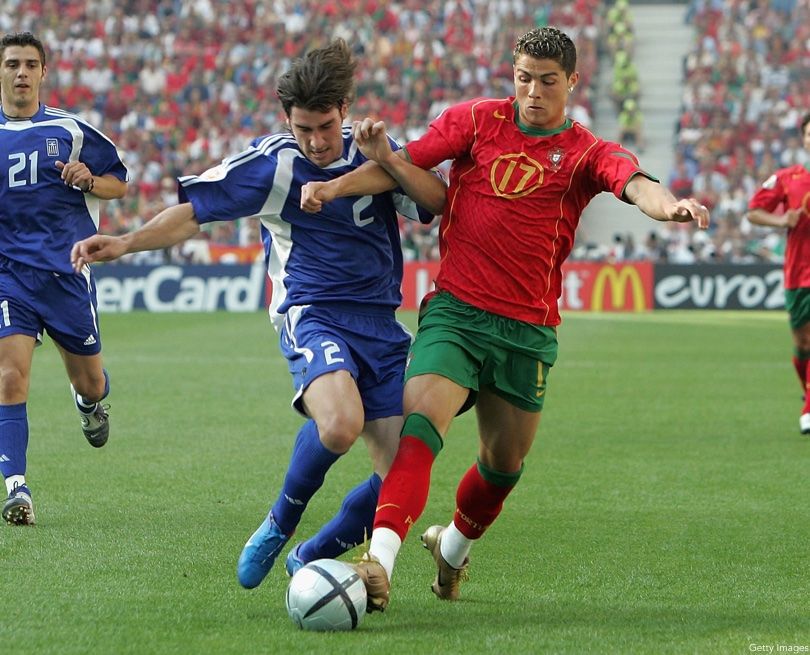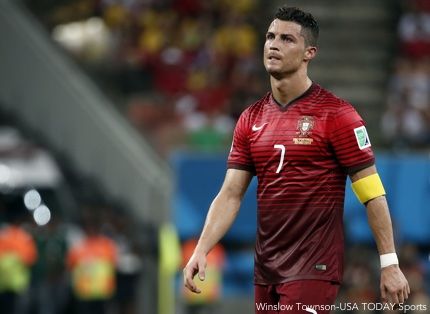In June, Portugal arrived in Paris a 20-1 long shot to win the European Championship. After an unexpected run, the nation made the final against host France.
The task seemed too tall for Portugal, lacking the talent of past national teams, and relying on an aged, injury-plagued Cristiano Ronaldo for offense. France featured the tournament's top three goal-scorers with Antoine Griezmann (six), Dimitri Payet (three) and Olivier Giroud (three), a midfield loaded with talent and a world-class goalkeeper in Hugo Lloris. But Portugal had a precious advantage: Institutional memory.
The 2004 European Championship was held in Portugal. The host team featured stars including Ricardo Carvalho, Luís Figo and a promising 19-year old who had recently signed with Manchester United for a transfer fee of $15.91 million. His name was Cristiano Ronaldo.

Portugal made a deep-run, knocking off powerhouses England and the Netherlands en route to the final at Estádio da Luz in Lisbon. Its opponent was Greece, which started the tournament as a 150-1 underdog. Neither side had ever won a major international competition.
Despite holding an advantage in talent, experience and crowd support, Portugal lost to Greece 1-0 in the championship match.
Greece's victory was referred to by BBC SPORT as the "greatest Euro shock ever" and was recently labeled by ESPN as the "most unlikely triumph in major tournament history." Greece was condemned for its defensive style of play, with ESPN pundits calling the final and the entire tournament "a victory for anti-football." After scoring just seven goals the entire tournament, Greece produced a triumph of artisans over artists.

Portugal's road back to a major final was long and full of heartbreak: Losing to France in the semifinals of the 2006 World Cup, falling in the quarterfinals to Germany at Euro 2008, knocked out by eventual tournament champion Spain in the round of 16 at the 2010 World Cup and another semifinal loss at Euro 2012 to future tournament champion Spain.
All of these losses were by one goal or in penalties.
In the 2014 World Cup, Portugal could not even get out of group play, getting blown out, 4-0, at the hands of eventual champion Germany, and drawing the United States.
Ronaldo, who wears the hats of captain, emotional leader, star player and leading scorer, was on the field for all those defeats (and the tie with The Yanks). He knows, first hand, that reality often differs from expectation.
And so, Portugal mimicked its former nemesis Greece at Euro 2016. It played anti-football.
Portugal advanced out of the group stage with three draws and no victories. It forced extra time to win its first elimination game, and it needed penalties to win its second. Portugal defended impregnably and risked nothing.
In the final, Portugal appeared overmatched at every turn. When an injury forced Ronaldo out of the game in just the 25th minute, Portugal seemed destined for yet another crushing loss.
Griezmann and André-Pierre Gignac were mere inches away from returning France to the pinnacle of European soccer. Stade de France waited anxiously for a moment to erupt in celebration, but one never came.
Thousands line streets in Lisbon to welcome Euro 2016 champions Portugal home – videohttps://t.co/Rd6bGWL2yU
— Guardian sport (@guardian_sport) July 11, 2016
In the 79th minute, Portugal manager Fernando Santos substituted in Éder. "[Ronaldo] told me I would score the winning goal for the team," the 28-year-old forward said.
In the 109th minute, Eder blasted a shot past a diving Lloris to break millions of French hearts. Just 11 minutes later, it was over.
The media's reaction to Portugal's tournament victory was unkind, even compared to Greece's reception in 2004. ESPN referred to Portugal as Greece without the underdog's spirit and the bottom of international football, saying, "Given a choice between beauty and brute tactics, between victory and doing just enough to get by, they chose the lesser option every single time."
Ricardo Carvalho & Cristiano Ronaldo started the EURO 2004 final against Greece in Portugal. #PORFRA #EURO2016 pic.twitter.com/NcHTkyTUBB
— UEFA EURO 2016 (@UEFAEURO) July 10, 2016
Another victory for anti-football. The original victims have become the perpetrators.
But none of that matters in the streets of Lisbon, where the party went on. And on. And will not stop. Neither will it matter in the course of history, for tactics and score lines will surely be forgotten.
Only one fact is ageless: Portugal and Cristiano Ronaldo are the European champions in 2016.
More Soccer:
-- Lionel Messi Retiring From Argentina? Maybe Not
-- Top 10 Upsets In History Of International Soccer
-- One Of Iceland's Soccer Coaches Works Part-Time As Dentist
Follow Jack Minton on Twitter @jackminton95.





